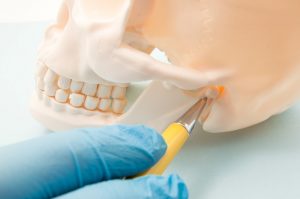 Your temporomandibular joints (TMJ) are located on either side of your face, connecting your jaw to your skull. The hinge-like joints allow you to open and close your mouth and make other necessary movements. However, inflammation in the joints can make it painful and difficult to make even the simplest motions. In some cases, your jaw can even lock in an opened or closed position. Known as a TMJ disorder, chewing, laughing, and yawning can be painful, but those aren’t the only concerns. It can even affect your speech. TMJ doesn’t have to control your quality of life or take away your ability to speak clearly. Your dentist has the solutions you need for TMJ therapy.
Your temporomandibular joints (TMJ) are located on either side of your face, connecting your jaw to your skull. The hinge-like joints allow you to open and close your mouth and make other necessary movements. However, inflammation in the joints can make it painful and difficult to make even the simplest motions. In some cases, your jaw can even lock in an opened or closed position. Known as a TMJ disorder, chewing, laughing, and yawning can be painful, but those aren’t the only concerns. It can even affect your speech. TMJ doesn’t have to control your quality of life or take away your ability to speak clearly. Your dentist has the solutions you need for TMJ therapy.
What Is a TMJ Disorder?
A TMJ disorder refers to pain or dysfunction of the joint and surrounding areas. When the bones, muscles, ligaments, and nerves of the joint don’t work in harmony, it can cause clicking or grating sounds, facial pain, difficulty moving the jaw, and even headaches. TMJ disorders can also contribute to neck pain, ringing in the ears, and earaches.
There’s no single cause of a TMJ disorder; however, they are attributed to certain factors, like:
- An uneven bite
- Trauma or injury to the joint
- Untreated bruxism
- Shifting or missing teeth
- Arthritis
- Sleep disorders
Complications of Untreated TMJ Disorders
Tense and stressed muscles and other soft tissues can make it hard for your TMJs to perform correctly. This doesn’t just apply to eating, laughing, or yawning. The dysfunction can make it difficult to make motions for certain sounds. Your speech may sound slurred, or you may find yourself stumbling over words. Not to mention, you may not want to talk because your jaw hurts.
TMJ disorders can affect your speech in other ways, too. Ringing in your ears or grating sounds can be distracting. It can affect the way you hear yourself when speaking, which can make it difficult for people to understand you.
How is a TMJ Disorder Treated?
You don’t have to avoid talking or eating burgers. You have several solutions for TMJ therapy, which may include:
- Stress-Relieving Exercises: Stress can trigger grinding and clenching, which can lead to jaw inflammation.
- Jaw-Strengthening Exercises: Specific exercises can help strengthen and loosen the jaw muscles to improve function.
- Diet Changes: Eating soft foods that require minimal chewing can reduce pain and inflammation.
- Orthodontics: Correcting bite and alignment issues can create a balance between the upper and lower arches.
- Nightguard: A nightguard provides a cushion between the top and bottom teeth to absorb the pressure of biting and chewing.
- Oral Appliance: Your dentist can provide an oral appliance to train your jaw to rest in a more comfortable position.
You can conquer your jaw pain to protect your quality of life with the right plan for TMJ therapy.
About Dr. West
Dr. West earned her dental degree at the University of Southern California Dental School and has continued her education in many specialties, including TMJ therapy and neuromuscular/craniofacial dental pain. If you need TMJ treatment, request an appointment through our website or call (702) 602-4000.
